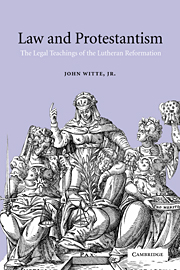Book contents
- Frontmatter
- Contents
- List of illustrations
- Foreword by Martin E. Marty
- Acknowledgments
- List of Abbreviations
- Introduction
- 1 Canon law and civil law on the eve of the Reformation
- 2 Loving thine enemy's law: The Evangelical conversion of Catholic canon law
- 3 A mighty fortress: Luther and the two-kingdoms framework
- 4 Perhaps jurists are good Christians after all: Lutheran theories of law, politics, and society
- 5 From Gospel to Law: The Lutheran reformation laws
- 6 The mother of all earthly laws: The reformation of marriage law
- 7 The civic seminary: The reformation of education law
- Concluding reflections
- Bibliography
- Index
7 - The civic seminary: The reformation of education law
Published online by Cambridge University Press: 17 November 2009
- Frontmatter
- Contents
- List of illustrations
- Foreword by Martin E. Marty
- Acknowledgments
- List of Abbreviations
- Introduction
- 1 Canon law and civil law on the eve of the Reformation
- 2 Loving thine enemy's law: The Evangelical conversion of Catholic canon law
- 3 A mighty fortress: Luther and the two-kingdoms framework
- 4 Perhaps jurists are good Christians after all: Lutheran theories of law, politics, and society
- 5 From Gospel to Law: The Lutheran reformation laws
- 6 The mother of all earthly laws: The reformation of marriage law
- 7 The civic seminary: The reformation of education law
- Concluding reflections
- Bibliography
- Index
Summary
The Lutheran Reformation was not only a fundamental reform of Church, state, and family, the three institutional pillars of the earthly kingdom. It was also a fundamental reform of the school and other institutions of education. Luther had already signaled the importance of educational reform in his revolutionary manifestos of 1520. By the end of the sixteenth century, a rich collection of Evangelical sermons, pamphlets, and monographs on education lay at hand together with more than a hundred new Evangelical school ordinances.
The Lutheran reformers' early preoccupation with educational reform was driven by both theological and practical concerns. The new Evangelical theology assumed at least a minimal level of education in the community. The doctrines of sola Scriptura and lay participation in the vernacular liturgy assumed literacy and popular familiarity with Bibles, catechisms, and liturgical documents. The doctrines of the priesthood of all believers and the calling of all persons to a God-given vocation depended on the ready access of everyone to an educational program that suited their particular calling and character. The doctrine of the civil, theological, and educational uses of law in the earthly kingdom presumed widespread understanding of both the moral laws of conscience and the civil laws of the state. Germany's traditional pedagogical beliefs and structures, the reformers believed, could not readily accommodate this new theology.
Moreover, swift educational reform was critical to resolving some of the most pressing practical problems to beset the Lutheran Reformation in its early years.
- Type
- Chapter
- Information
- Law and ProtestantismThe Legal Teachings of the Lutheran Reformation, pp. 257 - 292Publisher: Cambridge University PressPrint publication year: 2002



